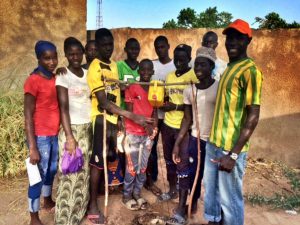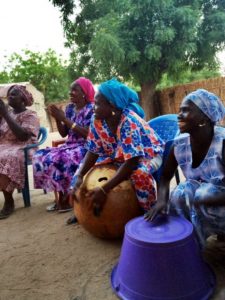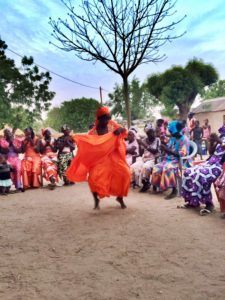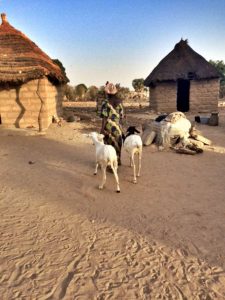This project is made possible through the partnership of WATER CHARITY and the NATIONAL PEACE CORPS ASSOCIATION. ![]()
 Location
Location
Gague Cherif, Region of Fatick, Senegal
Community Description
Gagua Cherif is a small village with a population of 1,000 people, located in the Fatick region of Senegal. The village is 17 kilometers south from Foundiogne and it is surrounded by the Sine Saloum delta. The local language spoken in Gagua Cherif is Sereer, one of the minority languages spoken in Senegal.
In Gagua Cherif, like most rural villages in Senegal, farming and fishing are the main sources of income for families. Peanuts, millet, and corn are sold after the farming season to provide a yearly income.
The women are the central force of the community. They wake up for 5:30 am prayers and work throughout the day until dinner is finished around 9 pm. They pull water for the family, work in the fields, take care of the children, cook all the meals, and keep the house clean.
Problem Addressed
Due to the lack of financial means, combined with a lack of education on improved water and sanitation practices, there are few simple latrines in Gagua Cherif.
 Out of the 60 households that were randomly selected for a baseline study, 29 households reported not having functional latrines. The average households size has 7 to 15 people. Households that did not have functional latrines reported using the field for open defecation.
Out of the 60 households that were randomly selected for a baseline study, 29 households reported not having functional latrines. The average households size has 7 to 15 people. Households that did not have functional latrines reported using the field for open defecation.
70% of households reported having children under the age of six. Not only is this age group more susceptible to WASH-related illness such as diarrhea, but they are also more likely to be suffer from severe malnutrition.
Diarrhea is the most common illness reported at the local health facility. Mothers who did not have a functioning latrine in their household reported disposing of their infant’s fecal matter either near their compound or in the field. Not only does this decrease the integrity of the village, but it put children at risks for contracting common childhood illnesses.
Open defecation is also not unusual for the youth of school ages. With the people’s respect for hierarchy in rural villages taken into account, elderly men are usually place at a higher standard. This often means that household which already has access to a latrine often reserve it for the elderly or reserve it for guests as symbol of wealth and respect amongst their peers. The lack of access to latrines leads to a higher rate of open defecation within the community, and it also decreases the health status in the community
Project Description
This is a sanitation latrine project, working with families to improve their sanitation and hygiene practices by providing 35 simple ventilation-style latrines in the community of Gagua Cherif.
The design of ventilation-style latrine is very similar to that of a simple pit latrine, consisting of a superstructure and a pit with a covered slab for defecation. Compared to a simple pit latrine, the sole difference is that a ventilation style latrine is designed with a ventilation pipe, provided with a durable fly screen on the top. The ventilation allows odors to escape and minimizes the attraction for flies. A small gap is put in place above the door to allow the air to enter freely. The flow of air is increased if the doorway of the superstructure faces the prevailing wind.
 Recipients of latrines have agreed that latrines will be built on sites that are within 10 meters from the kitchen or homestead, at least 15-meters downhill from a water source, and at the back of a dwelling house for privacy purposes.
Recipients of latrines have agreed that latrines will be built on sites that are within 10 meters from the kitchen or homestead, at least 15-meters downhill from a water source, and at the back of a dwelling house for privacy purposes.
Digging of the actual pit includes digging the latrine to a depth of at least two meters. The pit ideally should be 1.5 meters above the highest groundwater table and free of cracks.
In order to have these latrines constructed, the community must contribute 25% towards the total cost of the project. 15% will be done in-kind, such as digging the hole and bringing sand and gravel from the fields, and 10% will be given in cash.
Water Charity funds will cover the costs of cement, metal, piping and mason fees.
The Case de Sante of Gague is working with the PCV to oversee the project, and contributing financially to bring it about. Water Charity previously worked with the previous PCV in the village on the Health Hut of Guague Cherif Well Project – Senegal and we had the opportunity to be present at the dedication of the new well.
Project Impact
531 people will benefit from the project.
Peace Corps Volunteer Directing Project
Constance Mulbah
Monitoring and Maintenance
The PCV and local counterparts will oversee the project. A local WASH committee has been put into place, consisting of a President, health community agent, and a local schoolteacher.
Let Girls Learn
Fundraising Target
$3,450
Funds raised in excess of the project amount will be allocated to other projects in the country.
Donations Collected to Date
$0
ADOPT THIS PROJECT BY CONTRIBUTING THE DOLLAR AMOUNT OF THE PROJECT
Donations of any amount will be appreciated. The full amount will give you “naming rights”, if that is something you would like.
Dollar Amount Needed
$3,450